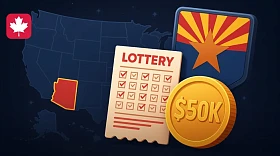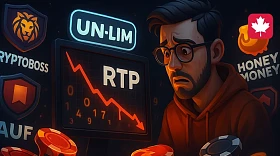
New Jersey’s Online Gambling Surge: A Warning Sign for Unregulated Advertising and Opaque Casino Practices
In a troubling turn of events, New Jersey’s online gambling market hit an all-time high in September 2024, with Atlantic City’s casinos and their partners raking in over $208 million. While this record-breaking figure may seem like a victory for the industry, it raises serious concerns about the unchecked growth of online gambling and the lack of transparency in advertising, especially when it comes to informing players about critical factors like Return to Player (RTP) rates.
The shift towards online gambling:
Although online gambling is often touted as the savior of casinos struggling to recover post-pandemic, this trend is fueling addiction, especially when flashy, unregulated advertisements lure players in without adequately warning them of the risks. These ads fail to mention crucial details, like the fact that many online games come with low RTPs, meaning players are far more likely to lose than win. With such aggressive marketing, it’s no surprise that online gambling has become a lifeline for casinos, even as in-person earnings remain stagnant or decline for many operators.
A deceptive picture of success:
The numbers from the New Jersey Division of Gaming Enforcement (NJDGE) paint an overly optimistic picture. The report highlights a total revenue of $558 million across casinos, online partners, and racetracks that accept sports bets, but these figures mask the underlying problems. The focus on maximizing revenue through internet gambling glosses over the potential harm to consumers, many of whom may be unaware of the low odds of winning or the predatory nature of some games. Without clear RTP disclosures, players are often gambling blindly, leading to increased losses and, in many cases, gambling addiction.
James Plousis, chairman of the New Jersey Casino Control Commission, celebrated the state’s online gambling success, but at what cost? The ongoing rise of internet gaming is benefiting casinos while putting the public at risk, especially as gambling ads flood the market with promises of easy money, without offering the full picture.
Winners and losers:
While some casinos, like Borgata, saw growth, others suffered significant declines. This uneven performance highlights the volatility of the industry and how online gaming is cannibalizing traditional casino operations. As Jane Bokunewicz from Stockton University noted, internet revenues now dominate the revenue mix, accounting for 40.8% of the total. Yet, behind these impressive numbers lies a dangerous dependency on online gambling, which relies heavily on advertising that targets vulnerable populations.
The rising revenues should prompt regulatory bodies to rethink their stance on gambling advertisements and enforce stricter rules. At the very least, ads should be required to disclose RTP rates and the real risks involved in online gambling. Without such measures, the industry’s growth will continue to come at the expense of public well-being.
Linked materials




tickscollar All this bullshit was invented to squeeze out the last money. It used to be easier - bet on red, win or lose. And now some chickens are running, airplanes are flying... Circus.



xSuiZ The article is fire! Everything was laid out according to the facts. Drake is not a ludomaniac, he is a walking advertisement. And while the suckers believe in his "curse", Stake rakes in the money. Beautiful, you can't say anything. I've been riding a steak myself for a year now, I threw in crypto and generally don't give a about all the blocking.


Leoak Finally a good article on NC! I've been playing them since the very beginning, since the first Deadwood. Yes, their dispersion is crazy, you can lose a deposit in 100 spins. But when he pours ... It's worth it. In Mental x15k I caught, I still remember this spin. The whole point is in their x-mechanics, they really change the game, and not just for show.


tealblossom 2 minutes to respond? Yes, this is a dream! Otherwise, while you wait for these operators, you will already want to play. It's high time!


2sMilkiMiDiosa FIRE IN THE HOLE 3!! SCAM FROM NOLIMIT! HIT 2K, SPIN $10, NOT A SINGLE, BONUS!! HE JUST EATS AND DOES NOT CHOKE! I'LL NEVER GET INTO THAT SHIT AGAIN!












































Online casinos are thriving off aggressive advertising, and it’s not fair to the public. They need to start including RTP info in their ads, or even better, stop the ads altogether. This boom in profits is coming at the expense of real people losing money they can’t afford to lose.
I agree with this article's take—without regulations or RTP disclosures, online gambling is basically a trap. The ads are everywhere, and they always make it look like you’re one spin away from winning big. But that’s not how it works, and people deserve to know that before they lose everything.
Everyone’s celebrating this 'record high' for online gambling, but no one’s talking about the addiction rates that come with it. These casinos are using every trick in the book to keep people playing, and no one’s being honest about how little chance there is to win. Banning ads should be a priority.
The fact that online gambling now makes up such a huge part of casino revenue is worrying. It’s basically preying on people who are at home, possibly struggling financially, and hitting them with targeted ads. They should definitely ban these ads or, at the very least, provide real information about odds.
It's alarming to see how much online gambling is being pushed without any real regulation. These flashy ads make it seem like a fun, easy way to win money, but people aren't being told how slim their chances really are. We need more transparency, like clearly showing the RTP rates on all games.